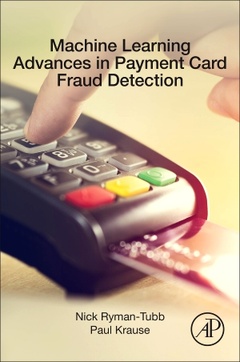Description
Machine Learning Advances in Payment Card Fraud Detection
Authors: Ryman-Tubb Nick, Krause Paul
Language: English
Subject for Machine Learning Advances in Payment Card Fraud Detection:
Approximative price 88.31 €
In Print (Delivery period: 14 days).
Add to cart350 p. · 15.2x22.9 cm · Paperback
Description
/li>Contents
/li>Readership
/li>Biography
/li>
Machine Learning Advances in Payment Card Fraud Detection provides a thorough review of the state-of-the-art in fraud detection research that is ideal for graduate level readers and professionals. Through a comprehensive examination of fraud analytics that covers data collection, steps for cleaning and processing data, tools for analyzing data, and ways to draw insights, the book introduces state-of the-art payment fraud detection techniques. Other topics covered include machine learning techniques for the detection of fraud, including SOAR, and opportunities for future research, such as developing holistic approaches for countering fraud.
- Covers analytical approaches and machine learning for fraud detection
- Explores SOAR with full R-code and example obfuscated datasets in a freely-accessible companion website
- Introduces state-of the-art payment fraud detection techniques
1. History of Payment Cards, Payment Fraud Prevention and Detection Technologies 2. Analytical Approaches to Fraud Detection and Understanding 3. Disruptive Payment Technologies and the Pivotal Event 4. Machine Learning for Fraud Detection 5. SOAR: A Tool to Transparently Explain Patterns of Fraud 6. The Future
Graduate level (MBA) and professionals working in credit card fraud detection and analysis
Paul Krause is professor in Complex Systems at the University of Surrey. He graduated in pure mathematics and experimental physics from the University of Exeter, and then spent the next ten years as a researcher in geophysics and then low-temperature physics. Following that, he moved to his main research career path in the theory and practice of AI. While maintaining, with a spirited defence, that we are far, far off any “AI singularity, he does believe that the computer age is providing us with a set of valuable tools to help us achieve a better understanding of the intensely interdisciplinary problems that complexity science is now beginning to address.

